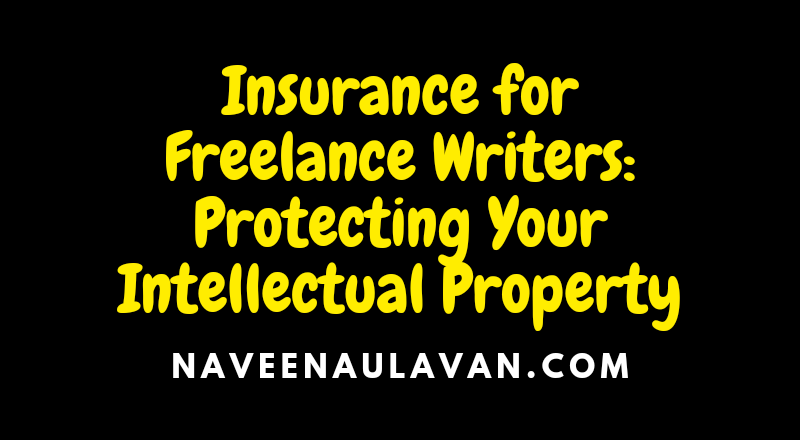As a freelance writer your intellectual property is your most valuable asset. Protecting your work ideas and creativity is crucial in the competitive world of writing. While insurance may not be the first thing that comes to mind when thinking about protecting your intellectual property it is an essential aspect of safeguarding your profession.
The Importance of Insurance for Freelance Writers
Insurance plays a vital role in providing financial security and peace of mind for freelance writers. It offers protection against potential risks and liabilities that can arise while working in this profession. Here are some reasons why insurance is essential for freelance writers:
1. Protecting against copyright infringement claims
One of the significant risks freelance writers face is the possibility of being accused of copyright infringement. Plagiarism or unintentional use of copyrighted material can result in serious legal repercussions and financial losses. Insurance coverage specifically tailored to copyright infringement can protect you from such claims and provide legal defense and compensation if necessary.
2. Defending against defamation claims
Being a writer means expressing opinions which can sometimes result in defamation claims. While you strive to present accurate and well-researched information you may still face the risk of being accused of making false statements about individuals or organizations. Insurance coverage for defamation claims can provide legal assistance and financial protection in such situations ensuring you can defend your work and your reputation.
3. Professional indemnity coverage
Professional indemnity insurance also known as errors and omissions insurance is designed to protect professionals against claims of negligence errors or omissions in their work. As a freelance writer you may encounter situations where a client is dissatisfied with your work or claims that it has caused them financial loss. Professional indemnity coverage can cover legal costs and damages associated with such claims allowing you to focus on your writing without worrying about potential liabilities.
4. Protection for physical assets
Insurance for freelance writers does not only cover intellectual property but can also include coverage for physical assets such as laptops computers and other necessary equipment. These items are essential for your work and insuring them can provide financial compensation in case of theft damage or loss.
Types of Insurance Coverage for Freelance Writers
Now that we understand the importance of insurance for freelance writers let’s explore some specific types of coverage that can benefit professionals in this field:
1. General liability insurance
General liability insurance is a fundamental coverage for any freelancer including writers. It offers protection against third-party claims for bodily injury property damage or advertising injury. For freelance writers this coverage can be beneficial if you conduct meetings or events where someone may get injured or if any property damage occurs while you are working at a client’s location.
2. Media liability insurance
Media liability insurance specifically covers risks associated with publishing content including defamation invasion of privacy copyright infringement and plagiarism. This type of coverage is especially relevant for freelance writers as it provides protection against legal claims related to their writing work.
3. Cyber liability insurance
In today’s digital world freelance writers often work online which exposes them to cyber risks. Cyber liability insurance helps protect against data breaches hacking and other cyber threats. It covers expenses related to notifying affected parties providing credit monitoring and handling legal matters that arise from such incidents.
4. Business property insurance
Business property insurance covers the physical assets and belongings of your freelance writing business. This coverage protects against losses resulting from theft fire vandalism or natural disasters. As a freelance writer your equipment and workspace are vital to your work and insuring them ensures continuity even in the face of unexpected events.
5. Equipment insurance
Equipment insurance specifically focuses on protecting your valuable writing equipment such as laptops cameras and other specialized tools. This coverage can provide financial compensation or replacement in case of damage loss or theft.
Choosing the Right Insurance Policy
When selecting insurance policies for your freelance writing profession there are a few key factors to consider:
1. Coverage options
Look for insurance providers that offer coverage options tailored to the specific risks faced by freelance writers such as copyright infringement defamation and media liability.
2. Policy limits and deductibles
Consider the coverage limits and deductibles to ensure they align with your needs and budget. Evaluate your potential liabilities and choose coverage limits that adequately protect your intellectual property.
3. Reputation and customer support
Research the reputation and customer support of insurance providers before making a decision. Read reviews seek recommendations from fellow freelance writers and choose an insurer with a track record of excellent customer service and claims handling.
4. Cost
While cost should not be the primary factor in choosing insurance finding coverage that is affordable within your budget is crucial. Compare quotes from different insurance providers to find the best balance between coverage and cost.
Conclusion
Insurance is a crucial aspect of protecting your intellectual property as a freelance writer. It provides financial security and peace of mind in the face of potential risks and liabilities related to your work. By choosing the right insurance policies you can focus on your writing knowing that your intellectual property and physical assets are well protected. Invest in insurance for freelance writers today and safeguard your profession for the future.
